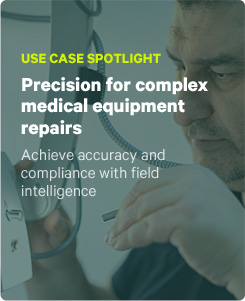 Compliance has different meanings for different people. For oil and gas executives, it signifies improving employee safety and reducing environmental risks, both of which can severely impact stock value and the corporate brand. For a services business, it means being able to track and report the status of SLAs (Service Level Agreements) to their customers. A janitorial company, for example, needs to report to customers which facilities have been cleaned, on which date and by which team. Accurate compliance reporting allows a business to remedy situations before customers complain, or respond to technical issues before a serious health or environmental accident occurs.
Compliance has different meanings for different people. For oil and gas executives, it signifies improving employee safety and reducing environmental risks, both of which can severely impact stock value and the corporate brand. For a services business, it means being able to track and report the status of SLAs (Service Level Agreements) to their customers. A janitorial company, for example, needs to report to customers which facilities have been cleaned, on which date and by which team. Accurate compliance reporting allows a business to remedy situations before customers complain, or respond to technical issues before a serious health or environmental accident occurs.
Here are five key ways that mobile apps, the cloud and analytics are transforming compliance:
1. Mobile data is deep & rich
Advancing to data collection on mobile devices has improved the quality and depth of data available to business leaders. Mobile devices are powerful data collection platforms with the ability to not only capture traditional text and numbers, but also rich media, such as photos, sketches and bar codes. Additionally, GPS and time stamps on collected data can ensure the work was done when and where expected. Since the mobile device is in the hands of the world’s most sophisticated sensor, a human being, other contextual information can also be added, including work notes, voice annotations and links to other related data. Finally, the ability to aggregate all of this information into one cloud-stored data record is incredibly empowering for any business.
2. The need for speed
Delays in receiving and handling documents, manual data re-entry into a reporting system and backtracking to collect clarifications can all lead to non-compliance. Mobile data collection eliminates multiple reporting bottlenecks, speeding up access to data. More quickly identifying non-compliance gives you the ability to respond and rectify where required. Based on scoring, some new mobile solutions can trigger action alarms to key stakeholders when serious non-compliance is uncovered. For example, a text message can be sent to alert a safety supervisor, or an emergency compliance report can be emailed to a corporate executive. Ultimately, collecting data digitally at the beginning of the journey increases not only the speed, but also the quality of reporting to key stakeholders.
3. If you can’t measure it, you can’t improve it
Your organization has benchmarks. Sometimes, they are regulatory. Sometimes, they are business commitments. Analytics can help you visualize how you’re trending against those objectives. Non-compliance in analytics systems not only stands out clearly, but with rich data, you can drill down several layers to identify at-risk processes and under-performing teams or employees. Analytics systems keep a deep history of collected data to track and compare trends over extended periods of time, which is valuable for compliance and performance tracking and responding to compliance audits. Additionally, you can design analytics reports to be scheduled and shared to all stakeholders, eliminating reporting delays that can negatively impact business decisions.
4. Connected to the cloud
Cloud platforms have transformed how we store, share and access data. In the compliance world, there are typically multiple stakeholders interested in different data reports and measurements. Some new mobile data collection systems have purposely designed their systems so that administrators can select which stakeholders get access to which data report and in which format. When choosing your mobile collection platform, ensure that you can easily configure data workflows that connect your field data and analytics reports to diverse cloud platforms. The agencies, partners, contractors and suppliers you have today may be different tomorrow, so being able to re-route a data workflow without hiring software engineers is a fundamental requirement.
5. A new business differentiator
These systems accomplish more than improving operational excellence. They are now becoming strategic business differentiators. Organizations that have deployed these solutions have a powerful advantage over competitors that track and report data the old fashioned way. Suppliers of oil and gas services and equipment, for example, can reduce job site risks and ensure equipment uptime by improved compliance. The ability to provide customers, partners or regulatory officials sophisticated real-time compliance reporting is helping businesses increase profits and win new opportunities.
Considering the benefits of improved compliance tracking and the perilous consequences of not being compliant, it’s no wonder that one of the hottest trends in compliance tracking is the adoption of mobile solutions, the cloud and analytics. Executives who manage compliance need to be thinking about how to adapt to the new mobile world – or risk being left behind.




